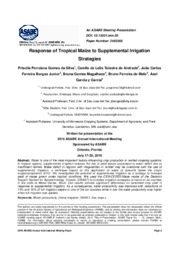Response of tropical maize to supplemental irrigation strategies.
Response of tropical maize to supplemental irrigation strategies.
Autoria: SILVA, P. P. G. da; ANDRADE, C. de L. T. de; BORGES JÚNIOR, J. C. F.; MAGALHÃES, B. G.; MELO, B. F. de; GARCIA Y GARCIA, A.
Resumo: Water is one of the most important factors influencing crop production in rainfed cropping systems. In tropical regions, supplemental irrigation reduces the risk of yield losses associated to water deficit due to insufficient rainfall. Water deficit in regions with irregularities in rainfall may be overcome with the use of supplemental irrigation, a technique based on the application of water at amounts below the crop?s evapotranspiration (ETc). We investigated the potential of supplemental irrigation as a strategy to increase yield of maize grown under tropical conditions. We used the CSM-CERES-Maize model of the Decision Support System for Agrotechnology Transfer (DSSAT) to simulate irrigation strategies of maize in six counties in the state of Minas Gerais, Brazil. Our results indicate significant differences on simulated crop yield in response to supplemental irrigation. As a consequence, water productivity was improved with reductions of 10% and 15% of full irrigation depths in one of the six counties while in two the water productivity was higher when full irrigation was applied.
Ano de publicação: 2016
Tipo de publicação: Artigo em anais e proceedings
Unidade: Embrapa Milho e Sorgo
Palavras-chave: DSSAT, Déficit de irrigação, Água
Observações
1 - Por padrão são exibidas publicações dos últimos 20 anos. Para encontrar publicações mais antigas, configure o filtro ano de publicação, colocando o ano a partir do qual você deseja encontrar publicações. O filtro está na coluna da esquerda na busca acima.
2 - Para ler algumas publicações da Embrapa (apenas as que estão em formato ePub), é necessário ter, no celular ou computador, um desses softwares gratuitos. Sistemas Android: Google Play Livros; IOS: iBooks; Windows e Linux: software Calibre.
Acesse outras publicações
Acesse a Base de Dados da Pesquisa Agropecuária (BDPA) para consultar o acervo completo das bibliotecas da Embrapa.

